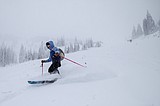Testifying before congress, Brodehl calls for more representation from gateway communities
KATE HESTON | Hagadone News Network | UPDATED 2 years, 2 months AGO
Kate Heston covers politics and natural resources for the Daily Inter Lake. She is a graduate of the University of Iowa's journalism program, previously worked as photo editor at the Daily Iowan and was a News21 fellow in Phoenix. She can be reached at [email protected] or 406-758-4459. | September 24, 2023 12:00 AM
Flathead County Commissioner Randy Brodehl told a congressional subcommittee last week that without a policy shift, communities that serve as gateways to national parks and other natural treasures could suffer economically from decisions made thousands of miles away.
Brodehl offered his assessment to the House Federal Lands Subcommittee on Sept. 19, testifying in support of the Gateway Community and Recreation Enhancement Act on behalf of the National Association of Counties. He spoke alongside representatives from the National Parks Service and U.S. Forest Service.
“When the federal government pushes down on our gateway communities, we can suffer millions of dollars in economic loss,” Brodehl testified.
The legislation, sponsored by U.S. Rep. Ryan Zinke and a bipartisan mix of his colleagues, looks to support gateway communities, create better data on visitation, develop a digital national parks pass and would require the National Park Service to engage with local stakeholders before closing or limiting access to a national park.
Brodehl said that the legislation would ensure the public retains access to their lands while lessening the burden placed on communities by tourism. It is a way for federal agencies and local governments to collaboratively tackle issues like affordable housing, infrastructure maintenance or visitor accommodation in tandem, he said.
The Flathead Valley saw an economic downturn this summer, Brodehl said, attributing much of that to the historically low water levels in Flathead Lake, which affected lakeside businesses and tourism agencies. Attempts by county leaders as well as the state’s congressional delegation to see water released from the Hungry Horse Reservoir into the lake proved unsuccessful.
When visitors cannot access Glacier National Park, for instance due to the reservation system, they recreate in the area elsewhere — like Flathead Lake, the county commissioner said. This summer, the low lake levels paired with the park’s reservation system hindered the economy, according to Brodehl.
“Without the Gateway Community and Recreation Enhancement Act, we are destined to repeat this devastating action every year because county and state officials do not have a seat at the federal decision making table,” Brodehl said.
Zinke’s legislation is a companion bill to one filed by Montana Republican Sen. Steve Daines and co-sponsored by U.S. Sen. Angus King, I-Maine, in the upper chamber.
“Legislation like Rep. Zinke’s bill will help gateway communities build on this success and continue to grow their rural economies by creating reliable, dependable access to federal lands,” said Rep. Tom Tiffany, R-Wisconsin, chair of the subcommittee.
Officials with the Agriculture Department and the National Parks Service both testified to their respective agency’s support of the bill, but suggested meeting with the sponsors and subcommittee on certain provisions to improve it.
“Gateway communities play an important role in creating and sustaining the recreation economy,” said Jacequlyn Emmanuel, associate deputy chief for the Forest Service through the U.S. Department of Agriculture.
Stakeholders are more than just community businesses, Zinke said. They include people who care about their local community and their insights ought to be valued, he said.
Zinke reached out to Brodehl to ask him to testify. The two served in the Montana State Legislature together previously and have discussed the issues gateway communities face multiple times, Brodehl said. Both expressed optimism about the bill’s chances of passage.
“I thought it received a favorable hearing,” Zinke said.
The bill will now be marked up with suggested amendments before the chair determines if it should go to the House floor. If it does, the legislation will be voted on either as a standalone bill or as a part of a larger package.
“I’m really feeling like this legislation has legs, it's gonna go, and I think it has great support from the committee,” Brodehl told the Daily Inter Lake after testifying.
Reporter Kate Heston can be reached at [email protected] or 758-4459.
ARTICLES BY KATE HESTON

Veteran-owned mobile boat repair service anchors down in the Flathead Valley
The Kramers launched Flathead Mobile Marine to use their skills — they have decades of experience performing routine maintenance checks on a variety of boats as well as working with engines and electrical systems — and help boaters in the community.

With ski season near, resort reaches deal with staff
After 18 months of negotiations, Whitefish Mountain Resort executives and the resort’s ski patrol union are finalizing a one-year contract for the upcoming season.

Trapped in a car wreck, Woods Bay woman credits teens with saving her life
Driving home from a quilting event in Bigfork in September of last year, Carol Martin remembered that the sky was clear, the sun was shining, and she had a headache.

